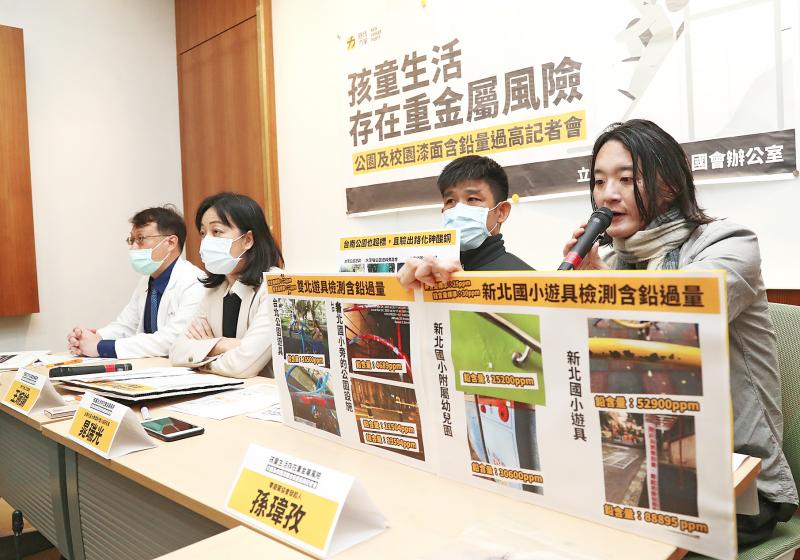After a survey found excessive levels of lead in playground equipment, advocates yesterday called for increased government regulation, as well as public awareness, of potential lead exposure from painted surfaces.
While public discussion about the dangers of heavy metals has often been focused on food safety, attention has seldom been drawn to the risks of heavy metals in playground equipment, New Power Party Legislator Claire Wang (王婉諭) told a news conference in Taipei.
Taiwan Zero Waste Alliance founder Sun Wei-tzu (孫瑋孜) said that a survey he conducted with researchers at Tainan Community University found that the levels of lead in the paint on playground equipment in some parks and schools in Taipei and New Taipei City were significantly higher than the maximum 90 parts per million stipulated in the National Standards of the Republic of China.

Photo: CNA
Chao Jui-kuang (晁瑞光), a researcher who is part of the university’s environmental action team, said that in Tainan, the survey found that while newer playground facilities generally met national standards, the paint on other equipment that might not be designed for children to play with, but was installed near play areas, such as street lamps, contained high levels of heavy metals that exceeded permissible limits.
The paint was peeling on many parts of the equipment and was within children’s reach, he said.
Regulations for the management of the safety of children’s playground facilities stipulate that monthly inspections should be performed using a checklist developed by the government, Wang said.
However, the checklist mainly includes items related to the outward appearance and functionality of the equipment, including whether the paint is cracking or flaking, she said, adding that it does not include items related to heavy metal content in paint.
Besides playground equipment, some of the other facilities at school campuses, such as fire safety equipment, might be coated with paint but are regulated by regular standards for architectural features instead of standards designed specifically for children, she said.
Considering children have a lower tolerance than adults regarding exposure to heavy metals, all paint used on school campuses should be held to stricter standards, she said.
“The impact of lead poisoning on children is almost irreversible,” said Lee Jung (李嶸), director of the pediatric emergency department at Linkou Chang Gung Memorial Hospital in Taoyuan.
Children absorb three to five times as much lead as adults when exposed to the same environment, he said.
At the same time, because preschool children’s kidneys do not function very well, their bodies cannot get rid of lead as well as adults’ bodies, he said.
Food, clothing, shelter and transportation are all areas where steps can be taken to prevent children from being exposed to lead, he said.
To minimize exposure to lead, children can wash their hands with soap after touching playground equipment with chipped paint, people should avoid giving them toys with unclear labeling or of unknown origin, and pieces of paint that have fallen off the walls of old residential buildings should be cleaned, as older paint is more likely to contain lead, he said.
Wang and the other attendees at the news conference proposed stepping up safety checks of the paint on playground equipment and making the results publicly available, as well as imposing stricter standards for painted surfaces in places frequented by children.

An essay competition jointly organized by a local writing society and a publisher affiliated with the Chinese Communist Party (CCP) might have contravened the Act Governing Relations Between the People of the Taiwan Area and the Mainland Area (臺灣地區與大陸地區人民關係條例), the Mainland Affairs Council (MAC) said on Thursday. “In this case, the partner organization is clearly an agency under the CCP’s Fujian Provincial Committee,” MAC Deputy Minister and spokesperson Liang Wen-chieh (梁文傑) said at a news briefing in Taipei. “It also involves bringing Taiwanese students to China with all-expenses-paid arrangements to attend award ceremonies and camps,” Liang said. Those two “characteristics” are typically sufficient

A magnitude 5.9 earthquake that struck about 33km off the coast of Hualien City was the "main shock" in a series of quakes in the area, with aftershocks expected over the next three days, the Central Weather Administration (CWA) said yesterday. Prior to the magnitude 5.9 quake shaking most of Taiwan at 6:53pm yesterday, six other earthquakes stronger than a magnitude of 4, starting with a magnitude 5.5 quake at 6:09pm, occurred in the area. CWA Seismological Center Director Wu Chien-fu (吳健富) confirmed that the quakes were all part of the same series and that the magnitude 5.5 temblor was

The brilliant blue waters, thick foliage and bucolic atmosphere on this seemingly idyllic archipelago deep in the Pacific Ocean belie the key role it now plays in a titanic geopolitical struggle. Palau is again on the front line as China, and the US and its allies prepare their forces in an intensifying contest for control over the Asia-Pacific region. The democratic nation of just 17,000 people hosts US-controlled airstrips and soon-to-be-completed radar installations that the US military describes as “critical” to monitoring vast swathes of water and airspace. It is also a key piece of the second island chain, a string of

The Central Weather Administration has issued a heat alert for southeastern Taiwan, warning of temperatures as high as 36°C today, while alerting some coastal areas of strong winds later in the day. Kaohsiung’s Neimen District (內門) and Pingtung County’s Neipu Township (內埔) are under an orange heat alert, which warns of temperatures as high as 36°C for three consecutive days, the CWA said, citing southwest winds. The heat would also extend to Tainan’s Nansi (楠西) and Yujing (玉井) districts, as well as Pingtung’s Gaoshu (高樹), Yanpu (鹽埔) and Majia (瑪家) townships, it said, forecasting highs of up to 36°C in those areas